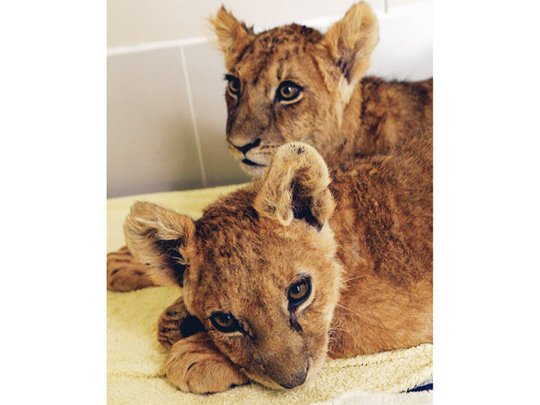
Dubai: The Abu Dhabi Wildlife Centre, which rehabilitates big cats, has offered to re-home the two lion cubs rescued by animal welfare officials from a travelling circus that had apparently neglected their health.
However, the fate of the lion cubs is uncertain as animal welfare authorities are currently investigating their owner's entry permits for the cubs, and licences to put on a circus show in Abu Dhabi and Fujairah.
Sultan Abdullah Sultan Bin Alwan, executive director for agriculture and animal affairs, added that the welfare of the cubs would also be investigated and an official report is expected to be filed by the animal clinic in Jumeirah where the cubs have been receiving treatment since Friday.
Undercover reporters
Finally, the attempted illegal sale of the cubs will be looked into. Mamdouh Al Helou, an Egyptian lion trainer unwittingly offered the cubs for Dh35,000 each to undercover reporters during an investigation.
Al Helou had a total of six lions, including the cubs, and one tiger stored in wooden transport crates in Dhaid.
There is a chance the cubs end up being sent back to Egypt, their country of origin.
"We have to check all the reports before this decision is made," said Bin Alwan.
"For the time being the lions are being taken care of and we will follow up this matter. The lions cannot be left in that cage and the other animals will be checked on as well," he said.
"This is not a one-day, or three-day issue. Until a decision is made they will stay in the clinic. We are building a case," Bin Alwan said.
One cub that was suffering from a distended belly has been "eating like there's no tomorrow" while the smaller one, which had severe constipation, still has not evacuated all the fecal matter he was given a mineral oil enema for.
‘Much better'
"Compare to how they were and how they are now, they are much better. One took baby steps for the first time. They like to be together and they groom each other; so when we have to move one out for treatment, the other one complains. The small one made the effort to stand when we had to treat his brother," said the vet.
"We gave them a good wash so they are a bit more presentable, I was really surprised by how stinky they were. In the afternoon we put them outside to get some sun. We will keep them as long as is necessary," he said.
A new home
Around 20 big cats like lions, leopards, cheetahs and tigers call the Abu Dhabi Wildlife Centre home. There they each have a grassy plot, a small pond, trees to climb and a cooled room for the hot summer months.
The centre has now offered to home the cubs and give them the care and space they need.
All the animals have been confiscated or rescued and in most cases received veterinary care after botched surgeries to file down teeth and rip out claws.
Ronel Barcellos, manager of the centre has worked for 15 years to set up this centre under the patronage Sheikh Mansoor Bin Zayed Al Nahyan, to rehabilitate endangered big cats.
"We would like to offer the two cubs a place at our centre. We have rescued a few lions in the past and we have enough space here to relocate the cubs, if need be," said Barcellos.
"There is even a few small cubs for them to play with. We don't trade in animals at all, we welcome donations if animals need to find a new home. We have a lot of confiscated and rescued animals," she said.
One such animal was a lion cub found tied up in a residential garage which needed reconstructive teeth surgery. "He was totally disfigured. The teeth were removed and the nerves were exposed so he couldn't eat. The claws were pulled out and whoever it was ripped off the pads of his paws too. It's a cruel, inhumane thing to do," she said.
Animals that end up at the centre are given privacy to recover from whatever trauma they have survived. "The animals can see each other which is soothing and calming for them. Most of the animals are not fit for the wild, without claws or teeth they are left to live in captivity, but we try and recreate the wild as much as possible."












